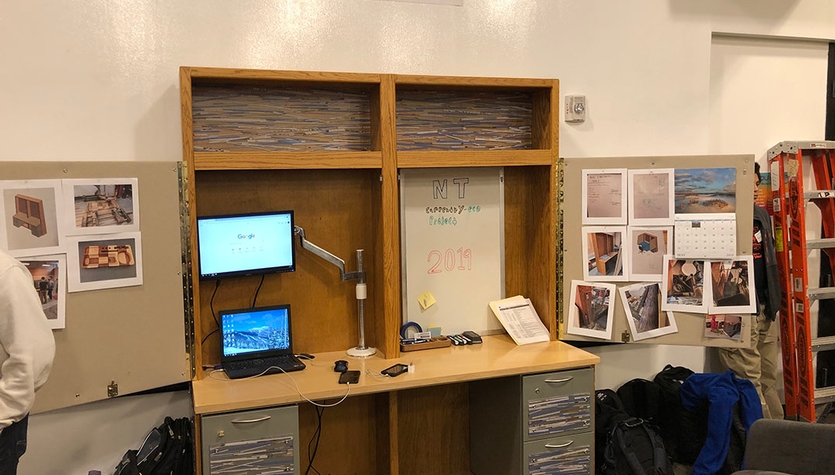Spotlight On...Mentoring Carpentry Challenge
May 13, 2019 | Author: Neal Swain and Jared Crowley
Each year, The Furniture Trust challenges students from local high schools to compete in their annual Eco-Carpentry Challenge. The Furniture Trust is a nonprofit organization serving the Greater Boston area that seeks to relocate discarded office furniture, with the intent making a positive impact by donating items to local schools and nonprofits and decreasing the amount of waste in landfills. The Eco-Carpentry Challenge allows students from participating high schools 18 weeks to repurpose used office furniture into functional items. The reconstruction process takes place in the schools’ woodworking spaces, and all work is performed by the students themselves.
Neal Swain and Jared Crowley served as mentors for two different teams, meeting with the students periodically to provide guidance, feedback, and ideas.
Neal’s team from East Bridgewater Junior/Senior High School built a collection of different Boston-sports-themed games and teaching tools for three organizations: Boys & Girls Club of Boston, the Friendship Home in Norwell (a place for developmentally disabled adults and teenagers), and the Central School in East Bridgewater. The writing easels they created for the Central School allow the younger writers to practice their handwriting at varying angles as they develop. EBJSHS made trial easels for the Central School last year and they were such a success they received a specific request for more!
Jared’s team from Nashoba Tech built a workstation for the local school resource officer, so he has a working desk when not interacting with the students. The desk has separate folding storage units to provide both a writing board and tack board, along with lower filing cabinets. The upper storage area features a custom cut recessed 3form product with under cabinet lighting. The desk was a collaboration between the carpentry students and the engineering students, who assisted with design drawings.
As part of their mentorship with these schools, Neal and Jared helped guide students through brainstorming ideas, discussed the merits of their ideas, and provided creative problem-solving when new constructability concerns arose. They also collaborated on interview preparation for the event and developed a format for students to present as a cohesive team rather than presenting in isolated roles. The teams had a few opportunities for interview practice along the way, and the mentors were excited to see the kids lean into the process and be engaged.

